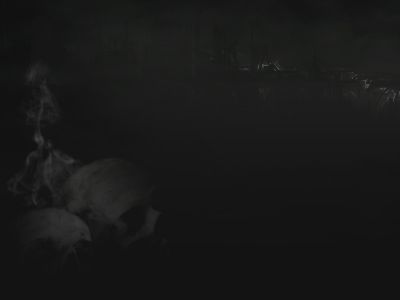Post by Ludmila Ilyukhin on Jun 15, 2013 6:58:26 GMT -7

LUDMILA ILYUKHIN
--------------------------------------------------------------------------
◊ FULL NAME: Ludmila Petrova Ilyukhin.
◊ CODENAME: Niva.
◊ GENDER: Female.
◊ RACE: Rusalka.
◊ AGE: 675
◊ APPEARANCE: The years following Nuada’s victory have been unkind to Ludmila. Bitter fighting has cost her one eye and her face is now hideously slashed by an ugly jagged scar extending from her forehead to her lip. Her eyes are perpetually lined and her skin seems to have taken on a slightly grey colour. Other than that Ludmila looks like an usually pale and thin human woman, with short very blonde hair and one big grey eye with a gaze as hard as steel. She has a somewhat angular face made even more severe by scars and age. Her hair has become bone white, which clashes with her usual human appearance of a woman in her early forties. Her hair is sometimes gathered into a small bun, held together by a white comb.
This however is just a disguise she uses to hide her true form. When she removes her comb, her appearance undergoes a dramatic change, as her eyes become bigger and lose their pupils and irises, leaving just two ghostly pools of white. Her body will also become a lot more pale, and her skinny form will become almost emaciated. She is not very tall, measuring about 1 m 64.
◊ ATTIRE: Ludmila’s appearance tends to be shabby nowadays. She usually wears her security guard overalls, and when she’s off duty she wears a simple telnyashka (striped shirt) and jeans. Her missing eye is covered by a black leather eyepatch. She doesn’t really bother with wearing her comb regularly any more.
◊ FACE CLAIM: N/A
--------------------------------------------------------------------------
◊ AFFILIATION: BPRD.[/justify][/blockquote]
◊ PROFESSION: Security guard.
◊ PERSONALITY: Ludmila’s present state of mind can be summed up thusly: “Seen too much and done too much.” The former Soviet agent is washed up and lost, unsure of her future and unsure of her own identity. Her past haunts her constantly and the rusalka is often consumed by regret and longing for what she considers her “golden age”. Once fiercely loyal to authority and community, Ludmila’s recent breakdowns have made her more skeptical and suspicious of those around her as well as less willing to help. This altogether recent attitude has been worsened by depression and an inferiority complex, as she sees herself as a useless Cold War relic with no future.
Although many see her as a "cold bitch", for lack of a better term, Ludmila has a much nicer and softer side hidden beneath the icy surface. Those who manage to get beyond her cold façade will find a loyal and generous friend always willing to share a drink or her last loaf of bread. When she isn’t drunk or depressed, she is calm, practical and professional (this is rather rare nowadays for obvious reasons). Tact is also something that the rusalka lacks, and she tends to be brutally honest about most things. If someone bores her, she will most definitely tell him/her to leave her alone.
While she may seem cold and unshakeable, Ludmila can fly into terrible rages when provoked, or sink into the deepest depths of despair. These outbursts are thankfully rare, but are a terrible thing to witness when they do happen. When it comes to love and relationships, Ludmila avoids them like the plague. Her traumatic experience with “her” knight has left her rather skeptical of love and attraction and she sees the whole thing as a weakness.
Oddly enough, Ludmila loves children no matter their species. Their innocence and boundless energy always draws a smile from her, and she loves telling them stories, whether they are fairy tales or tales from her own past.
◊ ABILITIES:
-Extreme resistance to cold temperatures: rusalki being native to some of the coldest areas in Russia they have an "immunity" to cold. Ludmila is no exception, and could comfortably walk around Antarctica naked. She simply does not feel cold. Interestingly enough, she can also survive being frozen in ice.
-Supernatural affinity with water: being a creature whose origins lie in water, Ludmila is a very fast and agile swimmer. She can also remain submerged for as long as she wishes.
◊ SKILLS: Ludmila is first and foremost a soldier. She is an expert at using firearms and has extensive training in airborne and commando operations as well as in close combat (she has mastered fighting with an entrenching shovel). She also has a strong tactical mind honed by decades of military operations, and can boss soldiers around without any problems. She speaks four human languages (Russian, French, German and English) and is fluent in Troll and Elvic.
◊ WEAKNESSES:
-Ludmila performs badly in arid areas and is generally averse to high temperatures. Should she be trapped in a hot and dry place, she will become dehydrated and eventually die. Afghanistan was particularly hard for her due to its arid climate.
-Ludmila is a seasoned alcoholic, and that problem has been getting out of hand over the past few years. She drinks day and night and also drinks on duty.
-Her comb is more than a disguise as it also helps keeping her alive. If she lost her comb, Ludmila would be forced to immerse herself in water every week or dry out and die. Although she used to wear it all the time in the past, she has grown a lot lazier and careless as of late, only bothering to wear her comb on certain days.
-Her health has gone downhill due to age, alcohol abuse and smoking.
◊ EQUIPMENT:
-Comb: a comb given to her by the Baba Yaga. It is as white as ivory and features intricate carvings and symbols. It was reportedly made from the blood and bones of a newborn.
-Bayonet: a World War 2 Soviet bayonet that Ludmila keeps on her belt.
-Beretta R93: an Italian-made machine-pistol.
◊ RESIDENCE: Ludmila lives alone in a small flat. The interior is grey drab and chaotic, with shelves filled with dusty Soviet memorabilia and three perpetually overflowing ashtrays disposed here and there. Empty bottles of grain alcohol can be found absolutely all over the place, some having been converted into lamps or candle holders.
In Ludmila's (messy) bedroom is a corner of order and neatness wedged between the closet and the window. It is a shrine to her past, complete with photographs of her father and people she used to know. Her old Soviet uniform is nearby, clean and ironed and kept on display on a mannequin. An AK-74 and a Mosin-Nagant rifle lie hidden at the back of the closet, cleaned, greased and ready for use.
◊ FAMILY:
-Piotr Ilyukhin (deceased).
-Spirit of the river Niva (fate unknown).
--------------------------------------------------------------------------
◊ HISTORY: Ludmila was “born” on a cold night of the year 1355 when a young woman, abandoned by her lover, threw herself into the waters of the river Niva. Her early life was uneventful, as she was nothing but a creature that some would describe as a “drone” with no will or mind of her own. It wasn’t until the year 1587 that her life took a turn for the unexpected. One evening, as Ludmila and her rusalki sisters were swimming in the reeds, she saw an armoured man trot past the river on a horse. Intrigued she followed him, swimming quietly out of his sight.
For a whole week she followed him and every time he made camp and went to sleep she would leave the river and watch him. The man was young and handsome and was unlike the peasants and travelers she’d seen before, for he was a vityaz, a knight trained in the art of warfare. As his travels extended into their second week, the Rusalka grew more obsessed with him. For the first time in centuries she began to feel her own emotions and her mind began to conceive its own thoughts; unbeknownst to herself she was breaking away from her former state and entering a new one, setting a terrible chain of events in motion.
Ludmila fell deeply in love with the young vityaz, but it soon became apparent that his journey was coming to an end and that he would leave the banks of her river. As her love for him grew stronger so did her pain. On the knight’s final night on the banks of the Niva, Ludmila left its waters and travelled deep into the woods, calling for one of Russia’s oldest and most powerful beings: the Baba Yaga. The ancient witch appeared before the rusalka, her withered face split by a knowing grin. The witch knew all about the rusalka’s sorrow and said she could help her, but Ludmila must think carefully before choosing. As she spoke, the Baba Yaga drew an ivory white comb from her rags and presented it to the rusalka.
“This comb”, said Baba Yaga, “will hide your true nature from the eyes of man, but you must wear it at all times and never leave the door open for suspicion. Men are clever and hateful beings who can see through any disguise if given the chance. But dear child, you must also know that should you take this comb your life will be nothing but misery, for I can do nothing for your kind’s lifespan. You will live, child. Live to see the world change like it never has before, live to experience betrayal and abandonment, live to see death and commit murder. You will live to see the end of all things, child. Is this your wish?”
The warning was clear enough, but alas, Ludmila’s mind was clouded by her love for the knight. Without further ado, she took the comb from the Baba Yaga’s hand.
“Yes”, she said. The Baba Yaga smiled and shook her head.
“Sometimes ignorance is happiness, child. Think of that when you go to your knight.”
And so Ludmila turned her back on her old life. As she left the forest she was confronted by the spirit of the river, mother of all rusalki. Mother Niva could see the terrible seed that had been planted in her daughter’s mind, and her anger and sadness were great. She tried to reason with her daughter, begging her not to see the knight, but Ludmila grew angry and ran off, her heart awash with a storm of emotions she could barely control.
Later that night she made herself known to the vityaz, emerging from the bushes as a beautiful and pure maiden dressed in filthy rags. The knight was immediately taken by her beauty, and believed her when she told him she was a poor peasant girl who had got lost in the woods. He offered to take her to a nearby village the next day and Ludmila accepted, not knowing the consequences of such a decision.
The pair rode away from the river the next morning, and after a few hours arrived at a small village. The villagers crowded around them, amazed at Ludmila’s beauty. Unfortunately, the knight already had a woman in that very village, and upon seeing him with Ludmila, she went mad with jealous rage. A fight ensued, the village woman hurling accusations of infidelity at the knight. Ludmila panicked, not knowing why things were going so badly, and in doing so she took hold of the knight’s hand. This gesture enraged the village woman even more and she lashed out, trying to pull Ludmila off the horse by her hair. As the woman grabbed hold of Ludmila’s golden hair, she ripped her comb out and the illusion was broken. Horror and shock descended upon the villagers as they saw what Ludmila was really like: emaciated, deathly pale, eyes nothing but milky white orbs.
The rusalka pleaded with the knight, but it was too late. He threw her off his horse and into the mud, where the villagers descended on her as one. They dragged her to the church and with the priest began to build a pyre. The knight, however, suddenly felt pity for the weeping rusalka and ordered the priest to imprison her instead. Reluctantly the priest agreed. A hole was dug in the cemetery and a carved stone placed over it. Ludmila was chained up, an iron cross was placed around her neck and then she was placed in a wooden coffin. As the villagers lowered her into her prison, she looked up at the knight and said: “I’m sorry.”
In her prison Ludmila slept, her mind and body pushed into a strange catatonic state. The stone marking her resting place became a local attraction and legends grew around her. As she slumbered the world changed. Napoleon marched on Moscow, cannons roared and thundered and men and women died; yet still Ludmila slept. In her sleep she wandered the lands beyond that of Man, lands of dreams where past, present and future mingled. As she wandered she met other dreamers: humans dabbling in the occult, beings from the past and the future and elves. She met two elven dream-walkers. One laughed at her and told her she deserved what had happened to her. After all she had gone beyond her kind’s place in the world and defied creation.
The second one simply listened to her story and took it in stride. The two of them travelled together through the dreamlands, and he tried to show her the world’s forgotten history. Ludmila saw many things: the rise and fall of Hyperborea, Atlantis, the war between the Fae and Man. The elf also showed her things to come in the world of Man, and Ludmila saw terrible things which she couldn’t understand. The elf finally showed her a horned red creature with a hand of stone. In this hand lay the key to the world’s destruction, and Ludmila remembered what the Baba Yaga had told her.
But before the elf could go on, Ludmila was torn from the dreamlands and cast back into the world of Man. The harsh sound of spades breaking her free of her prison of earth and rotting wood reached her ears, and eventually a hole appeared. She was lifted out of her prison, her body frozen by time. The sun’s rays warmed her and gave her strength, and she opened her eyes, much to the horror and amazement of the shabby workers that had dug her up.
The year was 1868, and the village had grown into a town. The old cemetery was being destroyed to make room for a new church. The old legends surrounding the stone had been mostly forgotten, and Ludmila was quickly seen as a mysterious feat of nature and magic. A letter was sent to the Czar, who took an interest in the strange event. Eventually Ludmila was taken to Saint-Petersburg and kept in Czar Alexander III’s secret “menagerie” beneath the Winter Palace. There she was treated like an animal, locked in a gilded fish tank and shown to important court visitors. Scientists came to study her and concluded she was a rare kind of subhuman.
The years went by and Ludmila stayed locked in her tank. Little did she know that the Russian Empire was on its last legs and that soon the Czars would be cast down. In 1917, the menagerie was sealed and abandoned, leaving Ludmila in the dark for months. Finally, after what seemed like an eternity, a group of men destroyed the door to the palace basement and entered carrying torches and guns. These men were Bolsheviks headed by a Communist university professor named Piotr Ilyukhin. As they explored the dark basement, they found nothing but strange and dead creatures and weird artefacts. Nothing stirred or made a sound. They then came upon a large water tank, and as they shone their torches into its murky depths, Ludmila appeared.
After overcoming their initial surprise, the Bolsheviks started clearing out the basement. Many artefacts and creatures were destroyed, and Ludmila would have met the same fate had Piotr not taken an interest in her. After all, she could talk and displayed the same behaviour a sentient being would have. Piotr was allowed to take Ludmila in, and he took her to a small scientific institute outside Moscow in order to study her. He soon discovered that she was fully sentient and sapient, and he began to treat her like a human being. He gave her proper clothes, a room of her own and even named her “Ludmila” in memory of his daughter, who had died during the revolution.
As the years went by, Piotr began to refer to Ludmila as his “daughter” even moving her out of the institute and into his own home. At around the same time, the GPU expressed interest in forming a group specialized in occult and paranormal threats, even considering the recruitment and training of “non-human agents”. Piotr Ilyukhin helped convince the Soviet government of the necessity of such a group, and eventually the idea was approved. A few months later, Ludmila was recruited and taken into training.
Throughout the 1920s and 1930s Ludmila was taught how to use firearms and other weapons. She was also taught the Marxist world view, and she soon became an ardent Communist. After her training, Ludmila was drawn into a covert struggle with a new and terrible enemy: the Third Reich. The Soviets knew that Germany was preparing for war, but Stalin was intent on avoiding hostilities, thus Ludmila and the Special Sciences Service conducted espionage in Nazi Germany. When war finally reached the USSR in 1941, Ludmila was transferred to the S.S.S.’s military branch and was pulled head first into the chaos of World War 2.
In the years that followed, Ludmila witnessed the worst of mankind. Millions of soldiers were killed and devastation reigned everywhere. World War 2 also saw Ludmila join the killing as she fought German soldiers and otherworldly monstrosities alike. In 1944 she and other members of the S.S.S. thwarted a ceremony conducted outside Leningrad by the Germans, thus saving the city from annihilation. For this covert effort she was awarded the Hero of the Soviet Union and the Order of the Red Banner.
In 1945 she took part in the battle for Berlin, battling the S.S. and Gestapo behind the scenes. In 1946, after Germany’s capitulation, she was part of the Soviet delegation to Berlin and briefly met a young professor named Trevor Bruttenholm (she was unfortunately unable to pronounce his name properly).
After the war Ludmila worked on Nazi Germany’s “doomsday projects”, spending many days sifting through fragmented documents and visiting ruined sites in Eastern Europe. It was during that time that the Soviets became aware of Project Ragnarok, but since information was scarce the project was classified and forgotten. Later in the 1950s Ludmila witnessed the end of Stalinism. Her activity and background were investigated under Khrushchev, who was intent on purging Soviet administration of Stalinists.
In the 1960s she was re-assigned to the military branch of the S.S.S. and was sent to Vietnam. In the 1970s she participated in the extermination of a vampire coven somewhere in Siberia, and the 1980s she took part in the Soviet invasion of Afghanistan.
In the 1980s, the Soviet Union was on the brink of collapse. Ludmila’s faith in Communism had been sorely tested by her involvement in Afghanistan, and she was still recovering from the horrible experiences she’d undergone in that country. The dissolution of the USSR in 1991 came as a complete shock to her. Her alcoholism, already present since World War 2, became even worse and she started to smoke heavily. All around her the world she’d grown to love was being eroded by the new Russian government. On some years she wasn’t even paid. The government also restructured the S.S.S. and Ludmila lost her State-paid accommodation, forcing her to go live with her adoptive father Piotr.
In 1994 Ludmila was shipped to Chechnya, supposedly to help combat the use of occult means by the rebels in war. When she got there, however, she saw that she was being used in an ugly mop up mission involving the execution of suspected rebels. Disgusted, Ludmila abruptly left Chechnya and returned to Moscow, where she confronted the director of the S.S.S. Her unruly behaviour was severely punished and she was discharged.
Unemployed, alcoholic and depressed, Ludmila drifted in and out of despair. Things got worse when Piotr was diagnosed with lung cancer and medical bills started piling up. Finally in 2008, while she was sitting in a bar in the outskirts of Moscow, she was approached by someone who first appeared to be an American tourist. As they talked, the tourist told her he was an agent at the B.P.R.D. and that she was being offered work in the United States. The offer sent chills down the rusalka’s spine. The US and the Bureau had always been enemies of the S.S.S. during the Cold War, and now she was being offered to defect to them. The rusalka weighed her options. She’d lost her job and the economy was on the downturn. Her previous employers had also given her yet more things to feel guilty about. Why should she hang about?
She accepted the man’s offer, and later that year flew to America. Her initial involvement in the Bureau was minimal: simple field missions and questioning. Compared to other Bureau agents, Ludmila was little more than a shadow. Soon after she joined the Bureau life delivered one final blow to her morale: her father died. His death marked the end of the rusalka's old life and the beginning of a long period of confusion, unhappiness and loss.
Ludmila was completely unaware of Nuada’s activities right up until the Golden Army attacked the United States, and by then there was little she could do. As the terrible machines annihilated New York and spilled the blood of Man, Ludmila suddenly remembered what the elven dream-walker had shown her. The end times were coming and the Baba Yaga had been right all along. Ludmila was devastated. She participated in a couple of particularly bloody battles on the East Coast, one of which cost her an eye.
The years following the Bureau’s evacuation and Bruttenholm’s death were uneventful for Ludmila. She slowly slipped through the Bureau’s ranks, not even trying to stop her fall, and eventually became a poorly paid security guard. She let other agents reap the glory, content with her mediocre position. After all it was all she deserved. Some people did come across her dossier a few times and asked her why she was stuck with such a boring job, but all Ludmila said was “I don’t care anymore.”



